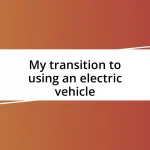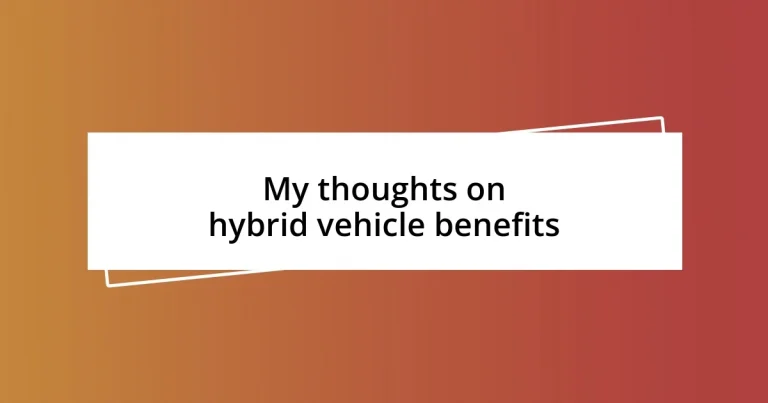Key takeaways:
- Hybrid vehicles offer significant fuel efficiency, achieving between 40-60 MPG and utilizing regenerative braking to enhance overall performance.
- Environmental benefits include reduced CO2 emissions and lower dependency on fossil fuels, contributing to better air quality and energy sustainability.
- Financial advantages consist of cost savings on fuel, lower insurance premiums, and potential government incentives that make hybrids more affordable and appealing for resale.

Introduction to Hybrid Vehicles Benefits
Hybrid vehicles have emerged as a game changer in the automotive world, blending the advantages of traditional engines with electric power. From my own experiences, I’ve felt the difference firsthand when driving my friend’s hybrid car; it’s like gliding smoothly and quietly over the asphalt. It makes me wonder, have you ever considered how much more pleasant driving could be with less engine noise and vibrations?
One of the most striking benefits I’ve encountered is the fuel efficiency that hybrids offer. The first time I calculated how much less I spent on gas on a road trip compared to my old gas-guzzler, I realized how significant those savings could be over time. It poses an intriguing thought: how many others might be losing out on these savings without even realizing it?
Then there’s the environmental aspect, which is incredibly important to me. Each time I hear about air quality issues in our cities, I think of how choosing a hybrid could be a small yet impactful step toward reducing emissions. It’s empowering to feel like my choice behind the wheel contributes to a cleaner planet—don’t you think it’s worth considering the broader impact of our vehicle choices?
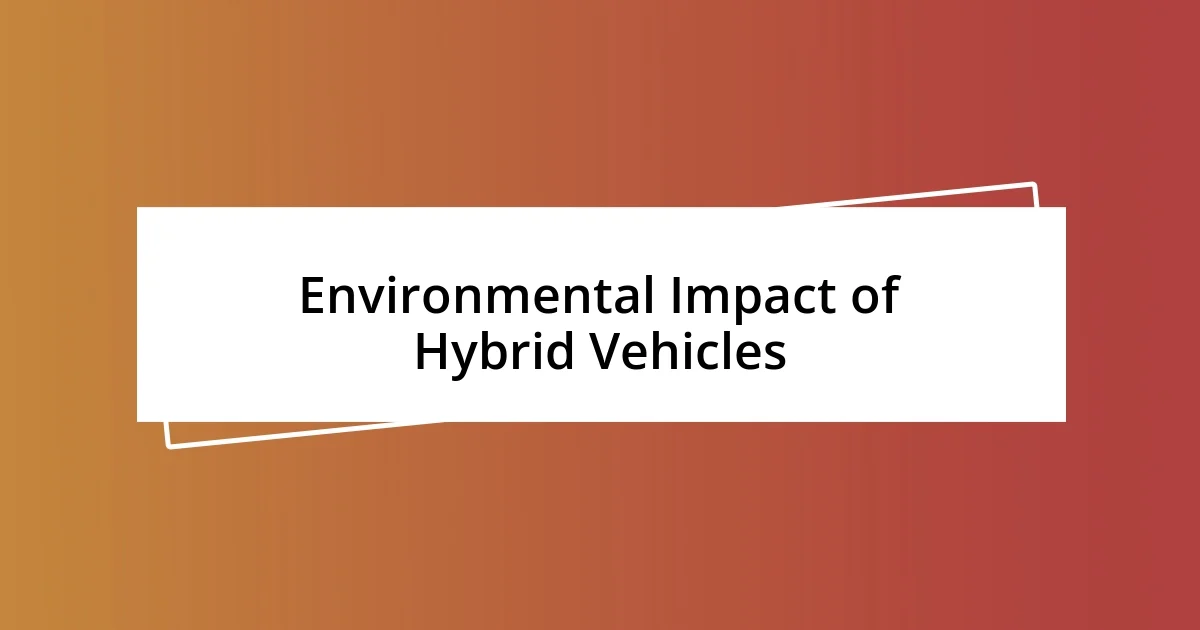
Environmental Impact of Hybrid Vehicles
Hybrid vehicles play a notable role in reducing greenhouse gas emissions. When I drive my hybrid, I can’t help but feel a sense of responsibility, knowing that I’m contributing to a decrease in harmful emissions. It’s uplifting to think that a small change in my driving choice can lead to better air quality for everyone.
One of the most compelling advantages I see with hybrids is their lower dependency on fossil fuels. I remember attending a community discussion on energy sustainability, where someone shared insights on how hybrid technology helps lessen the demand for oil. It struck me—by adopting hybrids, we take meaningful steps toward energy independence and sustainability, which is crucial for future generations.
To illustrate the benefits clearly, I’ve put together a comparison of emissions between hybrid vehicles and traditional gasoline cars. It highlights how impactful our choices can be on the environment.
| Vehicle Type | CO2 Emissions (Average per mile) |
|---|---|
| Hybrid Vehicle | 0.2 lbs |
| Traditional Gasoline Vehicle | 0.4 lbs |
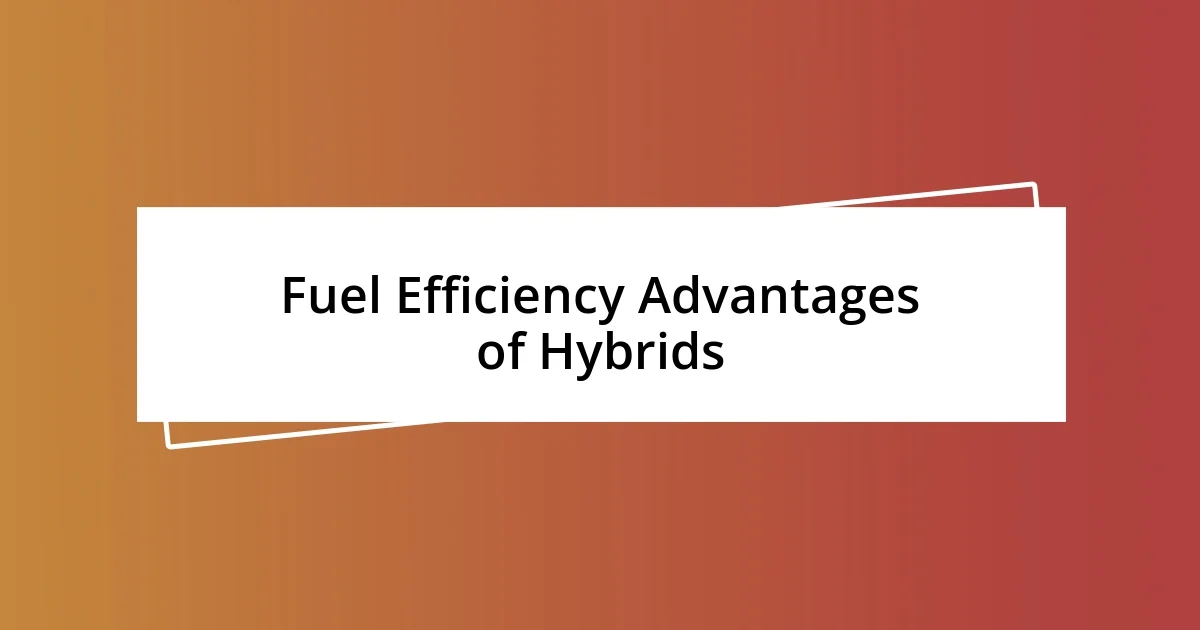
Fuel Efficiency Advantages of Hybrids
When discussing the fuel efficiency advantages of hybrids, I can’t help but reminisce about my last weekend getaway. I borrowed a friend’s hybrid for the drive, and as we cruised down the highway, I was astonished by how far we could go on just a single tank. That experience opened my eyes to the remarkable MPG (miles per gallon) ratings that hybrids typically boast, often surpassing their non-hybrid counterparts.
Here are some key fuel efficiency benefits of hybrid vehicles:
- Higher MPG Ratings: Many hybrids achieve between 40-60 MPG, which significantly reduces fuel costs over time.
- Regenerative Braking: This technology captures energy usually lost during braking, converting it back into power, which helps improve overall efficiency.
- Electric-Only Capability: Hybrids can operate solely on electricity for short trips, further enhancing fuel savings and minimizing fuel consumption.
- Optimized Engine Performance: They use advanced tech that adjusts to driving conditions, ensuring the engine runs at peak efficiency when needed.
- Less Frequent Refueling: With their higher efficiency, owners of hybrid vehicles can go longer distances between fuel stops, making road trips less of a hassle.
In my own experience, I’ve noticed that planning trips with a hybrid in mind not only makes the journey smoother but also brings joy at the gas pump when I see the fuel gauge barely dropping after hours of driving. It’s a small yet rewarding change that adds up, allowing for more spontaneous adventures without the looming dread of frequent pit stops.
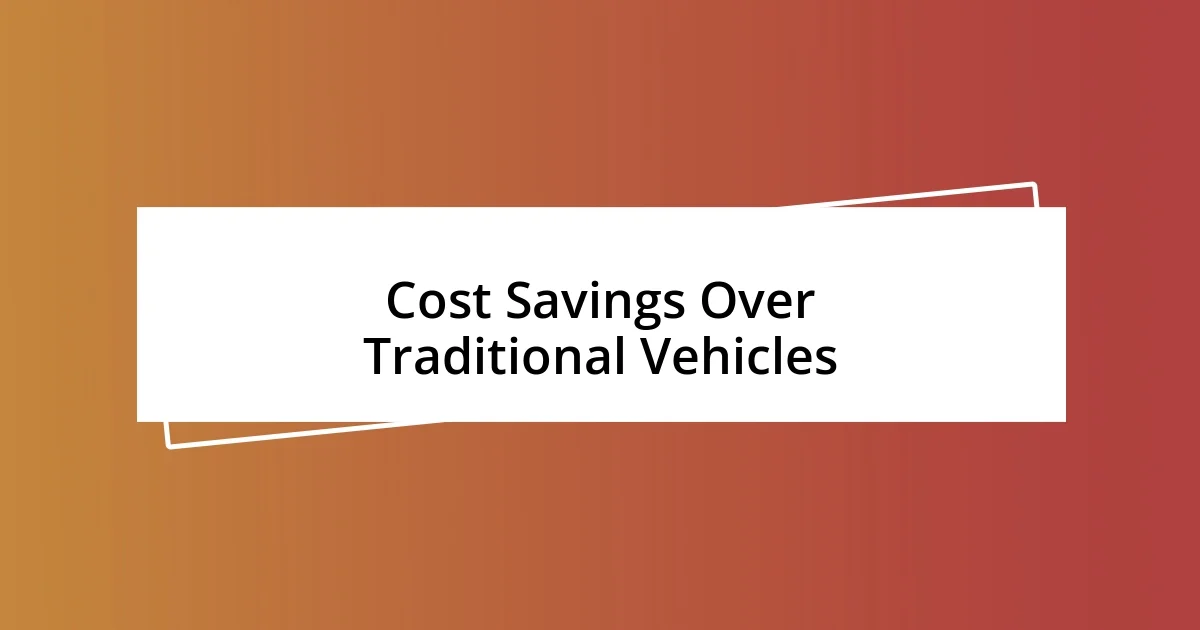
Cost Savings Over Traditional Vehicles
When it comes to cost savings, the financial impact of owning a hybrid vehicle quickly becomes evident. I remember the moment I calculated my monthly fuel expenses after switching from a conventional car to a hybrid—my jaw dropped! I realized I was saving nearly 30% on fuel alone. It’s astonishing how those savings accumulate and free up cash for other things, like a weekend getaway or that gadget I’ve been eyeing.
Insurance rates can also bring additional savings with hybrid vehicles. Many insurance companies offer lower premiums for hybrids due to their advanced technology and safety features. After contacting my insurance agent to discuss my new hybrid, I found my premium dropped significantly. It was an unexpected bonus, and it made me feel even smarter about my choice.
Lastly, let’s not forget the tax incentives available for hybrid owners. Each year, I eagerly check for any possible tax credits related to my vehicle. There’s something really satisfying about knowing that my environmentally conscious decision also positively impacts my wallet. Have you looked into this aspect? You might be pleasantly surprised to find that investing in a hybrid car can be a win-win situation.

Resale Value of Hybrid Cars
The resale value of hybrid cars often stands out as a significant perk, and I find myself reflecting on this benefit more than I anticipated. When I went to sell my first hybrid vehicle, I was pleasantly surprised by how quickly it found a buyer. The demand for used hybrids has surged, which translates to higher resale prices. Why? Many consumers are now increasingly conscious of fuel efficiency and environmental impact, driving up interest in these vehicles.
Another aspect that struck me during this process is how the reputation of hybrids has evolved over the years. Initially, I remember some skepticism around their reliability, but with advancements in technology, hybrids have become synonymous with durability and performance. In fact, I learned that hybrids often retain their value better than traditional vehicles due to their enduring economic benefits – a factor I consider invaluable when thinking about long-term ownership.
Moreover, I encountered the concept of market trends while exploring resale options. I recalled a friend who held onto their hybrid for nearly six years before selling it and still received a fantastic price. It was eye-opening to realize that factors like rising gas prices and the growing popularity of eco-friendly vehicles are only expected to enhance their resale value in the future. Have you ever thought about what your car might be worth in a few years? I bet the figures surrounding hybrid vehicles might just make you think twice about your own car choice!

Government Incentives for Hybrid Ownership
When I first considered buying a hybrid, I was excited to discover the array of government incentives available. These incentives often include tax credits and rebates aimed at encouraging eco-friendly choices. I still remember the sense of relief when I realized that a significant portion of my purchase price would be offset by these benefits, making my hybrid more affordable than I initially thought.
In addition to tax credits, many states offer various perks that can enhance the ownership experience. For instance, I was pleasantly surprised to find out that my state provided access to carpool lanes for hybrid drivers, even if I was driving solo. There’s something invigorating about zooming past the traffic while others are stuck in line, and it made my daily commute feel a bit more enjoyable.
Have you ever thought about the impact of these incentives on your decision-making process? Personally, knowing that the government supports my choice to go green made the transition even more meaningful. It’s a reminder that my decision isn’t just personal; it’s part of a larger movement toward sustainability and reduced emissions that benefits everyone.

Conclusion on Hybrid Vehicle Benefits
Reflecting on the benefits of hybrid vehicles, it’s clear to me that they offer a balance of efficiency and performance that many traditional cars struggle to match. I remember a family road trip where my hybrid delivered an impressive fuel economy, allowing us to travel further while spending less on gas. Can you imagine how nice it would feel to focus on the adventure rather than worrying about frequent fuel stops?
Moreover, adopting a hybrid vehicle has also shifted my perspective on environmental responsibility. Each time I drive my hybrid, I feel a sense of pride knowing that I’m contributing to a reduction in emissions. It’s amazing how something as simple as changing my vehicle can have a ripple effect on the planet. Have you ever paused to consider the broader impact of your car choices? For me, that thought makes my driving experience more meaningful.
Ultimately, the combination of financial savings, eco-friendliness, and growing market acceptance makes hybrids an appealing choice. I often share my experiences with friends who are contemplating making the switch, and they find the discussion refreshing. It’s encouraging to see more people embracing the hybrid lifestyle, and I genuinely believe that, as we move forward, the advantages of hybrids will only continue to gain traction.






